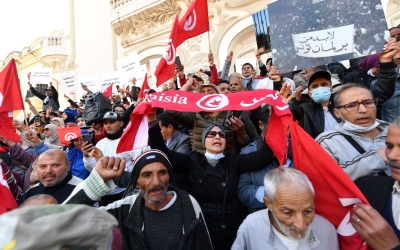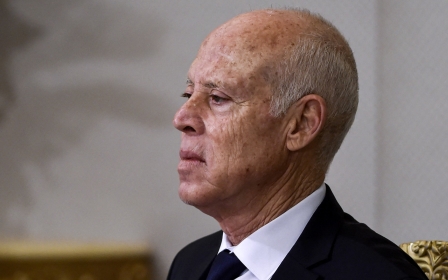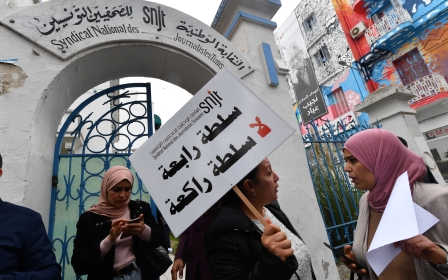Tunisia: President Saied's ex-chief of staff calls out ‘losers’ running country post-coup

Tunisian President Kais Saied's former chief of staff has fiercely criticised her ex-employer and his allies' governance of the country following the July 2021 power grab, branding them a “group of losers who do not understand anything”.
In a Facebook post on Monday, Nadia Akacha, who now lives in Paris, still spoke highly of last year’s coup, describing it as a necessary act to set the country on a “national democratic process” and "build a state of law".
“Unfortunately this moment and this path were seized by someone who has no honour, no religion, no patriotism,” she continued, in a thinly veiled reference to Saied.
"And by a group of losers who do not understand anything other than mastering vulgarity, distortion and deception.”
Akacha stepped down from her role as chief of staff in January, citing "fundamental disagreements" with the administration as the president's post-coup policies faced growing criticism.
New MEE newsletter: Jerusalem Dispatch
Sign up to get the latest insights and analysis on Israel-Palestine, alongside Turkey Unpacked and other MEE newsletters
Citing informed sources, the London-based news outlet Arabi21 reported that Akacha's resignation was due to army chief of staff Mohamed El Ghoul rejecting her request to arrest parliament speaker and Ennahda party leader Rached Ghannouchi.
Saied seized power in Tunisia in July 2021, dismissing the government and suspending parliament in moves denounced by his opponents as a coup.
Two months earlier, Middle East Eye had revealed that Akacha's office had a copy of a plan for Saied to take these very steps and declare a "constitutional dictatorship", which the authors of the document said would be a tool for "concentrating all powers in the hand of the president of the republic."
Saied cited skyrocketing unemployment, rampant corruption and the coronavirus pandemic as reasons for his power grab.
But Tunisia remains in a morass and a lack of concrete action has seen many supporters of his move become critical of the president and his policies.
'The president's commission'
Saied seized control of the country's electoral commission on Friday, saying he would replace most of its members, in a move that many fear will entrench his one-man rule.
The president, who says his actions were both legal and necessary to save Tunisia from an "imminent threat", is rewriting the democratic constitution introduced after the 2011 revolution, and says he will put it to a referendum in July.
In his decree on Friday, Saied said he would select three of the existing nine members of the electoral commission (ISIE) to stay on, serving in a new seven-member panel with three judges and an information technology specialist.
The judges would be selected by the supreme judicial council, a body he also unilaterally replaced this year, in a move seen as undermining the independence of the judiciary.
Tunisia's electoral commission head Nabil Baffoun told the Tunisian radio station Mosaique FM that Saied's decree was a blow to the democratic gains of the country's 2011 revolution.
"It has essentially become the president's commission," he said.
Baffoun had angered Saied by criticising his plans to hold a referendum and a later parliamentary election, saying such votes could only happen within the framework of the existing constitution.
"I have felt disappointment since 25 July," he said, "and I was adamant that I would not get involved in this path; but I have to, because the things that were achieved since 2011 are beginning to crumble."
Monica Marks, a Tunisia expert at New York University in Abu Dhabi, said she was shocked at the speed at which Saied had tightened his grip on power.
"Saied's decision to recompose ISIE, Tunisia's elections organising commission - which had been a hallmark achievement of its post-2011 democratic transition - extends his white-knuckled grasp over what were Tunisia's hard-won independent institutions. Another sad day for Tunisia," she said on Twitter.
While Saied has focused on restructuring Tunisian politics, a looming economic crisis threatens to unravel his plans, as the government struggles to finance its 2022 deficit and repay debts.
"The biggest threat to Saied remains Tunisia's economy, which sinks to increasingly dire lows in absence of any effective leadership. But whether enough Tunisians recognise this and rise up in time to stop KS from remaking [an] entire political system in his image is uncertain at best," Marks added on Twitter.
This article is available in French on Middle East Eye French edition.
Middle East Eye delivers independent and unrivalled coverage and analysis of the Middle East, North Africa and beyond. To learn more about republishing this content and the associated fees, please fill out this form. More about MEE can be found here.





